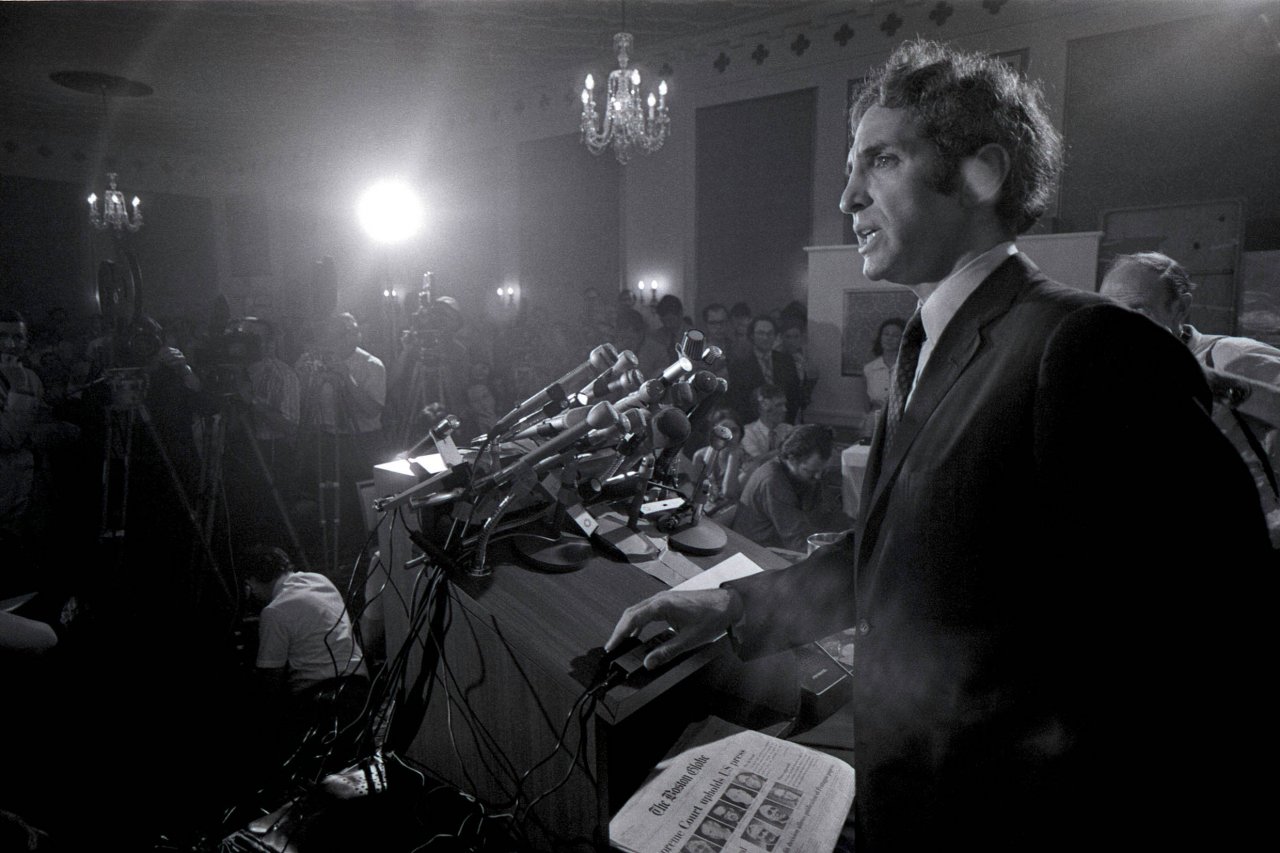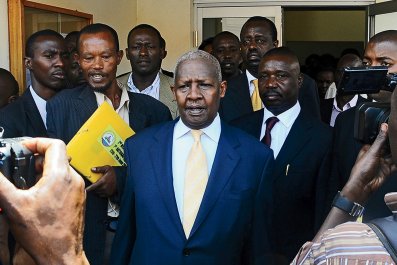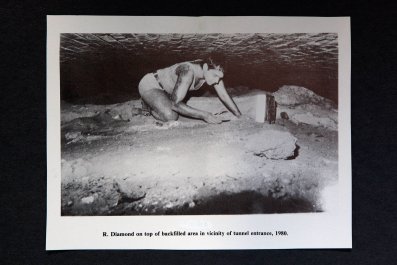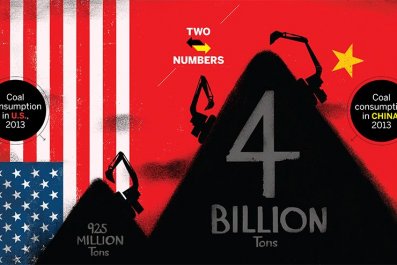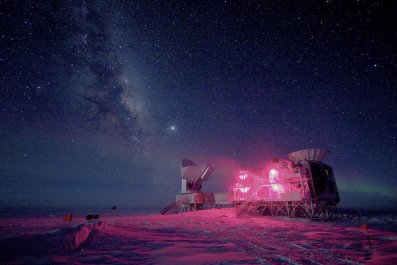First there was the Age of Aquarius. Then came the Era of Watergate, which began with leaks: first, of the Nixon administration's secret bombing of Cambodia and then the classified, dark history of the Vietnam War. Daniel Ellsberg was the Edward Snowden of his time, a largely unknown Defense Department analyst who gave a trove of documents—the Pentagon Papers—to The New York Times, and when a court order temporarily shut that channel down, other news organizations jumped in.
It was the worst of times, to invert a cliché, and the best. Worst, because the arrest of the Watergate Hotel burglars, who had been told to pursue Ellsberg at all costs, propelled the nation into a constitutional crisis that dragged on for two years. And it was the best, for many, because the crimes of Richard Nixon were exposed and punished, ushering in a new era of counterculture activism. Watergate-inspired activists and reporters flooded Washington.
The second coming of the '60s featured celebrity-studded Washington press conferences starring former intelligence operatives with their own tales from the dark side. Thus was born a leak counterculture, which quickly faded away after a CIA officer named in a magazine called CounterSpy was assassinated by Greek terrorists. National security whistle-blowers largely scuttled back into the shadows, protected only by the anonymity offered by journalists.
Then came Snowden. Like Ellsberg a generation earlier, he has been excoriated as a traitor. But not since Watergate has the anti-war left—not to mention millions of Americans frustrated by more than a decade of unchecked wars, warrantless wiretaps, CIA torture chambers and drone strikes—had such a transformative, and articulate, figure to rally around.
So Ellsberg came back to Washington this week to help seed a new flowering of leaks, if only virtually. Last week, a colorful, 6-foot-tall billboard featuring the former Marine and Pentagon counterinsurgency expert went up at a bus shelter a half-block from the Department of State's headquarters. In huge script, the white-haired, bright-eyed icon of leaks, now 83, implores U.S. diplomats and other national security workers, "Don't do what I did. Don't wait until a new war has started. Don't wait until thousands more have died, before you tell the truth with documents that reveal lies or crimes or internal projections of costs and dangers."
"I have a dream" it isn't. But it's likely to resonate for pocket-pencil-protected national security bureaucrats burdened by knowledge of government cover-ups. And should they be tempted to leak, there's an invitation to go to a new website with instructions and links for an encrypted, anonymous document dump. "Whistleblowers welcome," it says, somewhat gratuitously, on its home page.
The Ellsberg billboard is the battle pennant of this new whistle-blowing project, ExposeFacts.org, which was unveiled at a thinly attended news conference at the National Press Club in Washington on June 4. The display "is the first of its kind, and I can assure you, it's far from the last," said Norman Solomon, executive director of the Institute for Public Accuracy, the liberal media-advocacy group behind the project. More billboards will go up around federal buildings in the Washington area, as well as "the citadels of Silicon Valley and Wall Street," Solomon said, as fast as the money can be raised for them. "We expect to raise several thousand dollars between Monday morning and Monday night," June 9, he said, when an email push goes out to 430,000 people on a liberal grassroots mailing list.
ExposeFacts's founders say a new channel was needed for exposing documentary evidence of waste, fraud and abuse in classified government programs—things like weapon-systems cost overruns, intelligence-contractor kickbacks and legally questionable covert action projects, all of which are deeply buried under "Top Secret" stamps.
Solomon was flanked by three battle-scarred whistle-blowers, two of them former high-ranking, long-serving officials of the National Security Agency (NSA) who were true believers until their internal protests against electronic mass surveillance programs with billion-dollar cost overruns and no privacy protections were ignored. When these officials went outside of channels, they were pursued by Javert-like federal prosecutors. A judge threw out the charges against them, but only after a protracted, expensive struggle.
"We must rid the government of management criminals," said one of the former NSA officials, William Binney. The problem, said his former NSA colleague Kirk Wiebe, is that "there aren't any channels" inside the spy agencies to report and correct malfeasance while protecting secrets: Complaints end up on the desk of the bosses overseeing the programs, who have no motivation to act. With legislation to protect national security whistle-blowers bottled up in Congress, they argue that something new was needed.
"We want to make it more possible for people to tell when the government is off the track," Ellsberg said in a video message. The ExposeFacts website has an electronic bucket called SecureDrop, which works in concert with the Tor anonymizing software, also available on the site, to help leakers deposit documents confidentially. (Don't try this at home, it advises. Find a Starbucks.) It's a kind of WikiLeaks without tears.
"While no software can provide an ironclad guarantee of confidentiality, ExposeFacts—assisted by the Freedom of the Press Foundation and its 'SecureDrop' whistleblower submission system—is utilizing the latest technology on behalf of anonymity for anyone submitting materials," the ExposeFacts website says. "As journalists we are committed to the goal of protecting the identity of every source who wishes to remain anonymous."
Washington already has plenty of whistle-blower support organizations—with SecureDrop buttons and Tor software as well. "I think all that is becoming pretty much the standard," said Joe Newman, communications director for the Project on Government Oversight (POGO), founded in 1981 to expose Pentagon waste. But Newman welcomes ExposeFacts to the fray, telling Newsweek, "We certainly don't have a monopoly on working with whistle-blowers—there's plenty of room in this arena." POGO does not accept classified documents, he added.
Nor does the Government Accountability Project (GAP), another longtime whistle-blower group, according to its president, Louis Clark. But ExposeFacts, Clark told Newsweek, is particularly well positioned to deal with national security leakers because of the involvement of Ellsberg and former spy agency officials. "Anything Ellsberg is associated with," Clark said, "provides moral and intellectual standing. He's walked the walk, made the decision to disclose classified information. … He has the moral standing to be involved in this kind of organization."
The government, which has already pursued journalists as leakers' partners in crime, will undoubtedly attack ExposeFacts for being more left-wing activists than reporters. To be sure, its editorial board is led by well-known liberal crusaders like Barbara Ehrenreich, author of countless articles and 20 books exposing the reality of poverty in America; Sam Husseini, previously the media director for the American-Arab Anti-Discrimination Committee; and Sonali Kolhatkar, a Pacifica Radio host and co-director of a U.S.-based nonprofit organization that supports women's rights activists in Afghanistan.
Solomon is the author of a dozen books, including War Made Easy: How Presidents and Pundits Keep Spinning Us to Death, but is also co-founder of RootsAction, established to "resist the corporatist policies of Speaker [John] Boehner and cohorts at every turn, while confronting the Democratic Party's reflex of giving ground to extremist proposals in the name of 'bipartisanship.'" Its 40-plus member advisory board members range from Andrew Cockburn, Washington editor of Harper's Magazine and a longtime authority on national security and the armed forces, to feminist author-icon Susan Faludi. In between are lawyers, policy analysts and whistle-blowers from the Environmental Protection Agency, the State Department and even Britain's Government Communications Headquarters, the NSA's U.K. surveillance partner.
"We have been in dialogue with several news organizations" about collaborating on stories, Solomon said in an interview with Newsweek the night before the press conference. Its own editorial board "will be assessing all the submitted material and, when deemed appropriate, will arrange for journalistic release of information."
Not everyone's cheering, even among whistle-blower advocates. Mark Zaid, a Washington lawyer who has specialized in representing spy agency and Pentagon employees with a beef against their employers, was particularly appalled by the involvement of lawyers in ExposeFacts.
"You can't say to a client or prospective client, 'OK, give me classified information and I will protect it.' The possession of classified information without authorization is an ongoing crime," Zaid said in an interview. "There are no exceptions for lawyers, whether they have security clearances or not, to possess classified documents without authorization and secure storage capability.
"When lawyers are involved," Zaid added, "I'm really concerned. I don't believe we can ethically advocate someone disclosing classified information." Such a stance, he said, could be "encouraging vigilantism."
Jesselyn Radack, a former Justice Department lawyer who blew the whistle on alleged prosecutorial misconduct in the case of John Walker Lindh ("the American Taliban"), dismisses Zaid's comments. (She has also signed on with ExposeFacts as an adviser.)
"He's making up a hypothetical that's not there," said Radack, a former member of the District of Columbia Bar Association's Legal Ethics Committee and now the head of GAP's national security and human rights section. "Of course, lawyers can advocate that a client disclose classified information to, for example, a congressional intelligence committee or the U.S. Office of Special Counsel," she said by email.
"ExposeFacts is advocating what mainstream media journalists do every day: encouraging individuals to expose information that it's in the public interest to know," added Radack, a fervent Snowden supporter. "We still have a free press in this country."
"Judging from his comments," Solomon said, "Mr. Zaid does not understand what ExposeFacts actually is. He appears to be ignorant of the reality that ExposeFacts is a news organization run by journalists. ExposeFacts will not have 'clients'—it will have sources."
And they are needed, GAP's Clark argues. "The national security state is out of control. The criminalization of whistle-blowing, rampant over-classification, the demonization of the media—everything is out of control."
News of the new organization made one U.S. national security official nearly gasp. "Wow," he said when I showed him a picture of the Ellsberg poster. "I'm all for exposing lies and crimes, just not secrets that protect us!"
Of course, that's what they all say.
Newsweek Contributing Editor Jeff Stein writes SpyTalk from Washington, D.C. He can be reached confidentially via spytalk(at)hushmail.com



